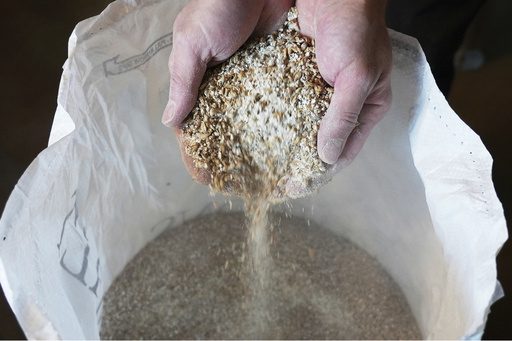ABU DHABI, United Arab Emirates (AP) — In 2018, Chad McGehee opened Side Hustle Brews and Spirits, an Abu Dhabi-branded brewery and distillery with funky camels on its cans and playful names familiar to anyone living in the United Arab Emirates.
The only problem was it was illegal to produce alcohol in the country, so his company made its hoppy India pale ale in the United States and then imported it to the UAE for sale.
That’s all changed as Abu Dhabi has overhauled its laws to allow for the micro and craft breweries that have taken the rest of the world by storm, part of a wider reconsideration of alcohol policies in the Islamic nation increasingly drawing tourists. And McGehee’s dream of IPAs in Arabia became a reality — though it took hard work as they were the first to open.
“The government had created a regulation around fermentation, but the steps of getting a permit, the steps of inspection, all of these things were not put on paper yet. So that had to be built out as we were going through this process,” McGehee said on a recent afternoon at his brew pub on Abu Dhabi’s Al Maryah Island.
Abu Dhabi long has been considered by those living in the UAE to be more buttoned-up than the rambunctious neighboring emirate of Dubai, home to night clubs, beach bars and pubs drawing tourists and residents to imbibe. In the seven emirates of the UAE, Sharjah outright bans the sale and consumption of alcohol, like neighboring Saudi Arabia, as well as Iran and Kuwait.
But beginning in 2020, Abu Dhabi changed its policies. It eliminated its licensing system for alcohol purchases for drinkers to boost sales and tourism during the coronavirus pandemic. Eliminating the licenses allowed Muslims, if they chose, to drink, as well as decriminalized alcohol possession for those without a license.
“I think progression in this country is par for the course, they’re always moving things forward,” said Nadeem Selbak, one of the partners at Craft, which is Side Hustle’s brew pub.
The Emirates still maintains a strict no-tolerance policy on drunken driving and public intoxication. Islam also considers alcohol consumption as “haram,” or forbidden.
But alcohol sales long have been a major driver of tax revenue and a moneymaker for the UAE. Dubai Duty Free, for instance, sold 6 million cans of beer last year, as well as 3.8 million bottles of liquor and 2.3 million bottles of whiskey for thirsty travelers.
But despite that demand, there was no local equipment available to open a brewery in the UAE. McGehee ended up importing almost everything for the brewery, nearly all of it coming from the U.S.
Abu Dhabi represents a completely untapped market for Side Hustle.
“The idea for me was like going back in time, when I started almost 20 years ago,” said Mitchell Dougherty, Side Hustle’s brewmaster.
At any given point, Craft has 14 beers on tap. So far this year they have brewed 34 and aim to reach up to 100 by the end of the year. The names of the beers include some winking reminders of life in the UAE, including one called “Massage Card Ninja” — a nod to business cards showing scantily clad women that appear under car windshield wipers in some Dubai neighborhoods.
McGehee said the different types of beers include ingredients from the Czech Republic, the United Kingdom, Japan and the U.S., covering a variety of palates for their international customers.
“If you look at Abu Dhabi, you have people from almost 200 countries,” he said. “They all have their own definition of what beer is, what craft beer is, or what lager is, or what IPA is, so we’re trying to cater to as many of them as possible.”



